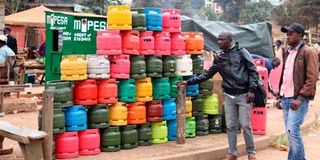Premium
Affordable LPG good action on climate change

A customer shops for cooking gas in Kibera, Nairobi.
What you need to know:
- The re-emergence of charcoal use will also be a major contributor to climate change and environmental pollution.
- Burning trees for charcoal is a huge distributor to deforestation. Research shows that deforestation has a dual impact on the climate.
Kenya envisions a newly industrialised middle-income economy with measures and policies to pursue low carbon and resilient development pathway by 2030. It is also one of the first countries to enact a comprehensive law and policy to guide climate action with commitment to abate greenhouse gases by 32 per cent by 2030 and clean energy development, energy efficiency and drought management among its priorities.
As of 2017, about 93 per cent of residential and commercial energy consumption in the country was fuelled by biomass sources, mainly charcoal and firewood. In February 2018, the government imposed a series of trade bans on the charcoal business and this accelerated the rapid growth of liquefied petroleum gas (LPG) with demand nearly doubling to 217,800 tonnes. This can be attributed to the low prices for cooking gas after the National Treasury scrapped value added tax (VAT) on it to cut costs and reduce use of kerosene and charcoal.
However, the latest amendment of the Finance Act 2020 by deleting LPG, including propane, from the zero-rated items under the second schedule to the VAT Act saw the reimposition of VAT on cooking gas as of July 2021, which is attributed to the exacerbated higher prices.
A story in the Daily Nation’s ‘Smart Business’ page says a wave of charcoal stock-up has been witnessed countrywide as Kenyans resolved to adopt cheaper energy alternatives. More households being pushed to use polluting fuels like kerosene and charcoal for cooking will further lag Kenya’s 2030 development goals of clean cooking solutions.
Double-pronged approach
The re-emergence of charcoal use will also be a major contributor to climate change and environmental pollution. Burning trees for charcoal is a huge distributor to deforestation. Research shows that deforestation has a dual impact on the climate. First, clearing forests releases carbon dioxide (CO2) into the atmosphere, where it contributes to rising global temperatures. Secondly, when trees are cut they release carbon, leading to global warming.
The Energy and Petroleum Regulatory Authority (Epra) should reanalyse LPG pricing to ensure every household, including low-income ones, has access to clean cooking energy. That would be a double-pronged approach as it will help have a clean environment with reduced illness and deaths as a result of charcoal use in homes. It will also cut air pollution by 90 per cent compared to traditional ways of burning biomass. CO2 emissions are relatively low as greenhouse gases are cut by 5-16 times.
Affordable LPG is one of the actions that will facilitate efforts towards stopping and tackling of the adverse effects of climate change, such as more frequent extreme weather events like droughts which last longer than usual, irregular and unpredictable rainfall, flooding and increasing temperatures.
Ms Pamella is a communication and media student at Maseno University. [email protected]





